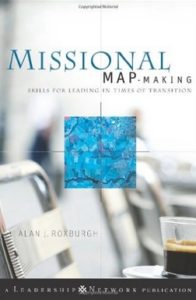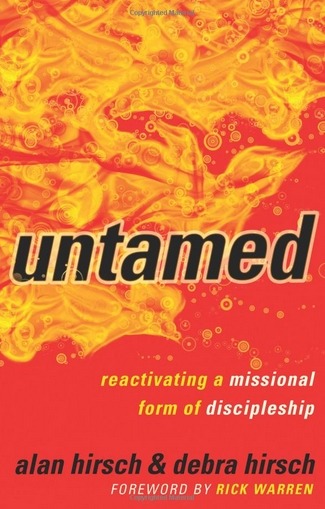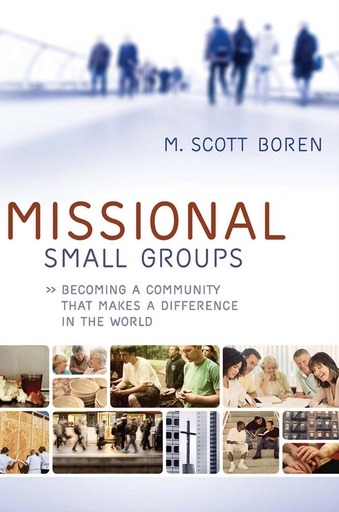Missional Map-Making: Skills for Leading in Times of Transition
by Alan J. Roxburgh
No amount of internal enhancement will result in a church’s ability to engage the changing context, because the people living in these neighborhoods are less and less prepared to go to a church. The purpose of map-making is to assist the people of a church in discovering that they need to attend to the environment in their neighborhoods even more than in their churches. (p.183)
Roxburgh lists eight forces that are reshaping our world and making our old maps for doing church irrelevant. These are globalism, pluralism, rapid technological change, postmodernism, staggering global need, loss of confidence on primary structures, the democratization of knowledge, and a return to Romanticism. The world around us is in the midst of a huge shift, but often the church continues to operate as if nothing has really changed. As a result we have become increasingly ineffective in reaching people outside the church. Roxburgh proposes strategies that will help us regain our bearings as leaders.
Assess How the Environment Has Changed in Your Context.
I needed a different imagination for what it means to be a church in a community and what it means to lead in such a church. One of the things this growing realization meant was that it would be possible to be a faithful community of God’s people only by reengaging the neighborhoods and communities where we live and learning to ask what was happening among the people of the neighborhood, attending to their stories, and cultivating receptiveness to being surprised by what God might already be up to among all these people who aren’t thinking about church or even God. (p.132)
Focus on Redeveloping a Core Identity.
We live in a social context where coherent frameworks of religious and ethical meaning are collapsing, and in response, people form their religious and ethic commitments from bits of this and that…one of the most critical leadership skills is the capacity to cultivate an environment that the enables the reforming of Christian life around the core identity of the Christian narrative. Leaders must create an…
environment in which people [are] wrestling with Scripture rather than taking notes about dates and times and meanings and predetermined answers. This is about giving the Bible back to the people of God in the conviction that they can hear the Spirit in the midst of this wrestling…
In Protestantism, the great bulk of the emphasis on formation has been placed on the teaching and preaching roles of the pastor. But as important as they are, these roles largely omit the most critical element of transformation in the early church: learning and living a new set of habits and practices…This cultivation of our DNA is one of the core leadership activities needed at this moment in time. (pp.132-142)
Create a Parallel Culture.
Although counterintuitive to the modern, Western imagination, it is the daily application of practices, not great ideas or big ideals (preaching and teaching doctrine), that reformulates the DNA of a community and changes our reality…
We have just lived through a long period of the church’s history in the West when we simply assumed that most people were Christians; we assumed that just by the fact of living in this culture, we were formed as Christians. Most of us now realize that it was never quite like that and that we have lost the habits and skills of Christian formation…(p.150)
Practicing the Offices – Reading and Meditation on Scripture and Prayer
In the practice of the offices, we remind ourselves and each other of the cost of our commitment to following God; corporately, we learn to discern how we crowd out the Lordship of Christ, which should be the one essential focus for our lives as a people. (p.153)
Practicing Hospitality
Hospitality, a profoundly Christian habit, is a radically alternative practice in a culture where people feel like strangers to one another in their own neighborhoods and where we are too often turned into commodities that others want to use in order to sell their goods…People no longer know one another in our society. Trust is low, and fear of the stranger is high…Welcoming the stranger is a revolutionary act in the formation of a parallel culture…
Hospitality forces us to confront the ways our lives are driven by agendas and demands that push away relational encounters with others…Creating a gracious table does not include an agenda to “convert” the stranger but to create space to listen to the stranger, nothing more…In the practice of hospitality, we confront our own need for conversion to the Gospel of the Kingdom. (pp.154-157)
Receiving the Poor
I suspect that it will be very difficult to become map-makers in this new space without habits directed toward overcoming our isolation from those who are pushed to the bottom…Unfortunately, affluence often makes it hard to embrace the parallel culture of the kingdom…Economic discipleship is not a side conversation for the Christian. How might we engage the ways we are held captive by values that block our ability to live more fully as kingdom people? How might we discover ways of being God’s people that involve economic accountability and sharing?…Simply giving money to the church does not address the question of forming communities of the kingdom where people grow in their awareness of the economic powers controlling their lives…
Cultivating a missional environment calls for the practice of nurturing a listening friendship with someone outside one’s own economic world, which goes beyond taking on people as a project or volunteering at a rescue mission. (pp.158-159)
Form partnerships with the surrounding neighborhoods and communities.
The imagination for what a local community of Christians might be doing in their neighborhoods is found among the people themselves, not in programs designed for another era or deemed by leaders as essential to the inner life of a church…This is why the role of leadership is that of cultivator rather than program planner, a shaper of dialogues rather than a cheerleader for established programs…
Mission-shaped leaders create environments of permission-giving and experimenting in which these ordinary dreams might be birthed…
But to cultivate missional environments, leaders must learn how to attend to information, understand its power, and develop the capacity to help congregations to interpret and filter it in the light of their commitments…knowing how to help people reflect on information within the biblical narrative…[this] can be achieved only when the leader moves away from the need to promote strategies and visions and becomes present to the people…It will be out of these interactions [with the people in the congregation] that people will start to tentatively name experiments they would like to test in being God’s missionary people in the community… The great reality of the church is that by the Spirit, God’s imagination for the future is already among God’s people, an so the work of leadership is in the cultivation of the environment that will allow this imagination to gather energy…There is a place for certain forms of strategic planning, but these are now found not at the beginning or coming from the center, but toward the end as people initiate experiments in mission…[giving] a careful delineation of how the mission will be carried out…This means that strategic planning happens at a micro-level across the diffuse and dispersed experiments being conducted in the neighborhoods. The people themselves are taking on the responsibilities of strategic planning.
Leaders can be available to assist and facilitate, connecting people with resources and so on…as mission emerges, as groups of people start to gather and shape the ways they will engage their context in witness and with kingdom life, there is a need for some strategic planning…leadership skills required are not about command and control but the continual encouragement, cultivation, and support of people. (pp.170-181)
I have been part of a leadership team at LifeNet that has been trying to implement such thinking, but let me assure you that the old ways of doing things runs deep. The Holy Spirit is working in his people, but we must be in this for the long haul. Nothing of this magnitude happens quickly.




